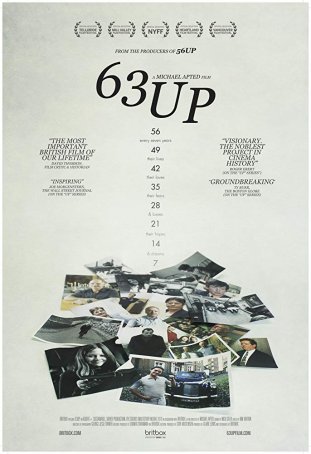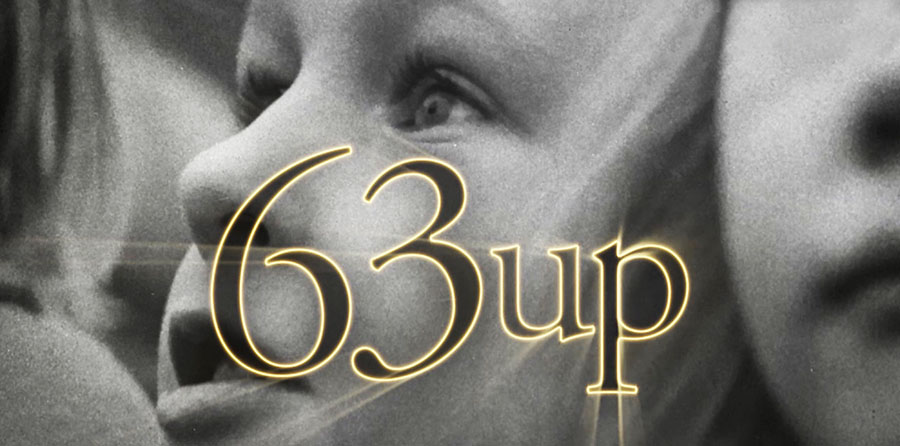63 Up (United Kingdom, 2019)
February 22, 2020
“Give me a child until he is seven and I will give you the man.” This Jesuit motto became the driving force behind The Up Series, a nine-volume (thus far) documentary that has spanned fifty-six years. Begun in 1964 under the direction of Paul Almond with Seven Up!, The Up Series quickly came under the stewardship of Michael Apted, who was a researcher on the first film before graduating to the showrunner thereafter. Over the decades, The Up Series has become synonymous with Apted and Apted with The Up Series. Of Almond’s contribution, he had this to say: “[Paul] was more interested in making a beautiful film about being seven, whereas I wanted to make a nasty piece of work about these kids who have it all, and these other kids who have nothing.” When it came time for Apted to take over, his vision became the driving force.
63 Up allows viewers to “catch up” with a group of eleven people and see whether the images and interview snippets from 1964 were in any way predictive of who they would become as they passed beyond middle age into their senior citizen years. As was true with 56 Up, Apted approaches the project as if it might be the last, keen to ensure that, if he is unable to gather the funding for another segment, this one will work as a finale. He has stated, however, that if he’s physically able (he is currently 79 so his age, more than that of his subjects, is an issue – it’s unlikely anyone would pick up the reins once Apted has laid them down), he would like to continue. 70 Up seems unlikely, but I would have said the same thing about 63 Up seven years ago. At some point, however, it will have to end.
63 Up represents the continuation of the greatest cinematic endeavor ever mounted. No other movie series has come close to matching this one for longevity and scope. Sure, James Bond has been around longer (ironically, Apted directed one of the Bond films, 1999’s The World Is Not Enough) but 007 has undergone reboots, cast changes, and multiple course corrections. Plus, it’s fiction. The Up Series is compelling because it’s real; we can relate to the participants because their experiences – physical and existential – track with ours. In the earlier films, we saw these people enter adulthood, fall in love, struggle with marriage and families, cope with the death of parents and the empty-nest syndrome, and face the decline of their bodies. The specter of mortality hangs high over 63 Up. Even those who are in relatively good heath are aware of the passage of years. Their lives are behind them. The future is no longer something to be shaped; it is to be accepted.
 Of the original fourteen participants, eleven have returned
for new interviews. Charles, who quit the series after 21 Up and has
since become hostile toward anything related to it, is barely mentioned. For
the first time, Suzy declined to participate. And, sadly, Lynn has died, marking
the first of the fourteen to pass away. (Apted filmed an interview with her
husband and children.) Symon, Peter, and John – all of whom had opted out for
one or more of the earlier installments – are all present and accounted for.
The eight stalwarts – Tony, Andrew, Jackie, Sue, Paul, Nick, Neil, and Bruce –
do their duties with varying degrees of enthusiasm. Some, like Tony, seem to
enjoy Apted’s every-seven-year visitations. (Tony comments that his
participation in The Up Series has accorded him fame greater than that
of Buzz Aldrin.) Others don’t necessarily enjoy the interviews but are
favorably inclined toward the project, recognizing its overall importance.
Others are more reluctant but participate nonetheless. John, who skipped both 28
Up and 42 Up, refers to it as a “poison pill.” Jackie has clashed
with Apted (because of the nature of questions he asks the women as opposed to
the more substantive ones posed to the men) yet she has never skipped a year.
Of the original fourteen participants, eleven have returned
for new interviews. Charles, who quit the series after 21 Up and has
since become hostile toward anything related to it, is barely mentioned. For
the first time, Suzy declined to participate. And, sadly, Lynn has died, marking
the first of the fourteen to pass away. (Apted filmed an interview with her
husband and children.) Symon, Peter, and John – all of whom had opted out for
one or more of the earlier installments – are all present and accounted for.
The eight stalwarts – Tony, Andrew, Jackie, Sue, Paul, Nick, Neil, and Bruce –
do their duties with varying degrees of enthusiasm. Some, like Tony, seem to
enjoy Apted’s every-seven-year visitations. (Tony comments that his
participation in The Up Series has accorded him fame greater than that
of Buzz Aldrin.) Others don’t necessarily enjoy the interviews but are
favorably inclined toward the project, recognizing its overall importance.
Others are more reluctant but participate nonetheless. John, who skipped both 28
Up and 42 Up, refers to it as a “poison pill.” Jackie has clashed
with Apted (because of the nature of questions he asks the women as opposed to
the more substantive ones posed to the men) yet she has never skipped a year.
It is not necessary to have seen every installment of The Up Series to appreciate what 63 Up offers. In keeping with the earlier films, Apted provides recaps for each of the subjects when their segment is introduced and intersperses the new material with old footage. No one is going to feel lost even if this is their first experience with an Up film. Nevertheless, the more volumes one has seen, the stronger this one will resonate. For those who have watched at least a few episodes, 63 Up provides an opportunity to revisit familiar faces at a more advanced point in their lives.
In recent years, The Up Series has experienced criticism in some circles because of its lack of diversity – of the original fourteen participants, only one was a man of color and only four were women. The other nine where white men. When one considers the era in which the series started, however, there was nothing untoward about this kind of a gender/racial mix and subsequent changes obviously couldn’t be made. Apted’s focus from the beginning was on class differences and, to that extent, the participants represent a reasonable cross-section of Britain’s social structure. (Both the U.K. and the U.S. attempted new versions of Seven Up to explore more diverse interview bases. Apted was involved with the U.S. production, which started in 1991 and made it to Age 21 before ending. The U.K. edition started in 2000 and has had follow-ups in 2007 and 2014. It remains to be seen whether there will be a fourth installment next year. Apted has no involvement in this.)
63 Up doesn’t add much that’s concrete to the existing mix. There are two exceptions: Lynn’s death and a revelation that Nick is terminally ill with cancer (and, in all likelihood, would no longer be alive if there is a 70 Up). For the other ten participants, this represents an incremental opportunity to see what their lives are like seven years beyond 56 Up. In the overall fabric of The Up Series, however, this is as important a chapter as any of the others, extending the social and anthropological aspects of what has become an important study. Watching 63 Up as a stand-alone endeavor may not seem remarkable. In fact, it may even be a little boring. But watching it as part of the larger picture imbues it with immediacy and power. It provokes self-reflection in a way that few other movies can. It is destined to be remembered long after those who have made it and appeared in it are no longer around.
63 Up (United Kingdom, 2019)
Cast:
Screenplay: Michael Apted
Cinematography: Ross Pimlott, Vince Martin, Bernard Kelly, Steve Horrocks, David Rose, Owen Scurfield, George Jesse Turner
Music:
U.S. Distributor: BritBox
U.S. Release Date: 2019-11-27
MPAA Rating: "NR"
Genre: Documentary
Subtitles: none
Theatrical Aspect Ratio: 2.35:1
Comments